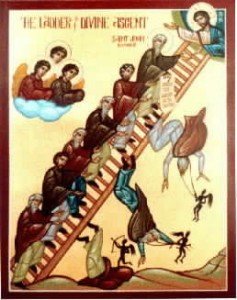 The 22nd Step on the Ladder of St. John Climacus, is VAINGLORY. St. John writes:
The 22nd Step on the Ladder of St. John Climacus, is VAINGLORY. St. John writes:
Like the sun which shines on all alike, vainglory beams on every occupation. What I mean is this. I fast, and turn vainglorious. I stop fasting so that I will draw no attention to myself, and I become vainglorious over my prudence. I dress well or badly, and am vainglorious in either case. I talk or hold my peace and each time I am defeated. No matter how I shed this prickly thing, a spike remains to stand up against me.
Although John agrees with the view of Gregory the Great, who considers vainglory and pride to be the same sin, he treats them separately in the Ladder since he regards them as two different stages of the same passion: Vainglory, fully grown, can give birth to pride, which is the beginning and the end of all evil.
Vainglory, being the beginning of pride, is a spiritual sin. As such, it easily works its way into the very fabric of spiritual life. Christians are apt to make pious excuses to justify this passion and to fool themselves into thinking they are acting in the name of God rather than for vainglory. St. John writes:
Dread vainglory urges us to pretend that we have some virtue which does not belong to us. It encourages us with the text: “Let your light so shine before men that they will see your good deeds.”
Furthermore, we seek to disguise our sins in order that people will think us righteous, but our excuse is that we must not scandalize our brethren. John writes:
Do not conceal your sin because of the idea that you must not scandalize your neighbor. Of course this injunction must not be adhered to blindly. It will depend on the nature of one’s sinfulness.
The notion of Christians being scandalized by the sins of others is very irksome. To be scandalized is in fact nothing more than a euphemism for being judgmental. Why should anyone be scandalized by the sins of their fellow Christians? Do we so easily forget that we too are sinners?
